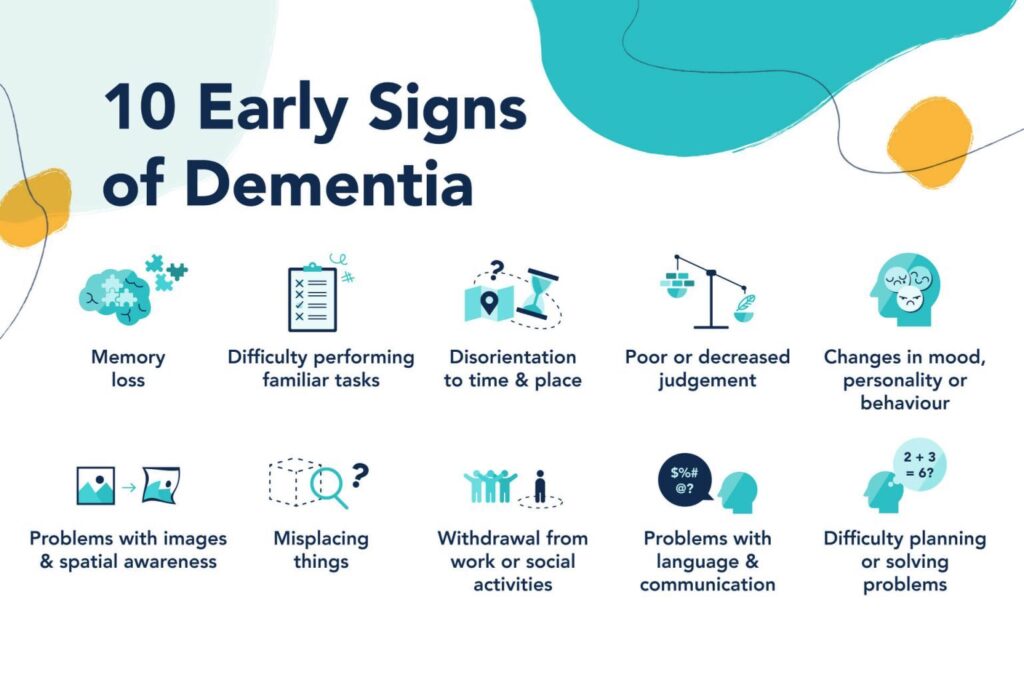Dementia is a word used to describe a collection of symptoms that impair memory, reasoning, and social functions to the point where they interfere with daily functioning. It is not a single disease, but rather a set of symptoms caused by a variety of underlying disorders. Dementia is an increasing global epidemic, affecting not only the affected but also their families and carers. In this article, we will explore dementia, its signs and symptoms, causes, kinds, diagnosis, treatment, risk factors, and prevention.
What is dementia?
Dementia is a broad term that refers to a variety of symptoms that impair the brain’s capacity to function properly. Memory loss, trouble communicating, confusion, and a deterioration in thinking skills are common symptoms. Although it is increasingly common in older people, dementia is not a normal component of ageing. It is a degenerative disease that worsens over time.
Signs and symptoms of dementia
The signs and symptoms of dementia may vary depending on the underlying cause of the condition. Some of the common symptoms include:-
- Memory loss
- Difficulty communicating or finding words
- Confusion or disorientation
- Poor judgement or decision-making abilities
- Problems with motor functions and coordination
- Changes in personality or behaviour
- inability to perform daily activities independently
- Difficulty with problem-solving or planning

Causes of dementia
Dementia is caused by various underlying conditions that affect the brain’s ability to function correctly. Some of the common causes of dementia include:
- Alzheimer’s disease
- Vascular dementia
- Lewy body dementia
- Frontotemporal dementia
- Huntington’s disease
- Parkinson’s disease
Different Types of Dementia
There are different types of dementia, and each type has unique symptoms and underlying causes. Some of the most common types of dementia include:
- Alzheimer’s disease – Alzheimer’s disease is the leading cause of dementia, accounting for up to 60% of cases.
- Vascular dementia – Vascular dementia is caused by diminished blood supply to the brain as a result of blood vessel obstructions or injury.
- Lewy body dementia – Lewy body dementia is a disorder in which aberrant protein deposits accumulate in the brain.
- Frontotemporal dementia – Frontotemporal dementia is a disease that affects the front and side of the brain, causing changes in behaviour, personality, and language.
- Huntington’s disease – Huntington’s disease is a hereditary illness that impairs the ability of the brain to operate normally.
- Parkinson’s disease – Parkinson’s disease is a progressive movement and coordination disorder.
How is dementia diagnosed ?
Dementia can be difficult to diagnose because many of its symptoms are similar to those of other illnesses. A complete medical history, physical examination, cognitive tests, and laboratory tests are often used to make a diagnosis. Imaging studies, such as CT scans or MRIs, may also be utilised to determine the underlying reason.
Treatment and care of dementia
There is no cure for dementia at the moment, although therapies can help control its symptoms and delay its progression. Medication may be used to treat symptoms such as anxiety, depression, and hallucinations.
The most common medication used to treat dementia by doctors is Piracetam.
Piracetam is a very general and efficient medication to reduce the symptoms of dementia. A balanced diet, frequent exercise, and social interaction are all examples of lifestyle modifications that can assist improve quality of life. Carers play an important role in managing dementia care, giving emotional support, and assuring the safety and comfort of those with dementia.
What are the risk factors of dementia?
While dementia can affect anyone, some factors may increase the risk of developing the condition. These include:
- Age – As people get older, their chances of having dementia rise.
- Family history – People with a family history of dementia may be at a higher risk of developing the disease.
- Genetics – Certain genes have been linked to an increased risk of acquiring dementia.
- Unhealthy lifestyle – Unhealthy lifestyle factors, such as poor eating habits, a sedentary lifestyle, and a lack of cognitive activities, all contribute to dementia.
Can dementia be prevented?
While there is no foolproof way to avoid dementia, there are some activities one can do to minimise their chances of having it. Here are a few ideas:
- Physical activity – Regular physical activity has been demonstrated to lower the risk of cognitive decline and dementia. Each week, aim for at least 150 minutes of moderate-intensity aerobic activity.
- Healthy diet – Maintaining a healthy diet, especially one low in saturated and trans fats, can help minimise the risk of dementia. Fruits and vegetables, which are strong in antioxidants, can also be useful.
- Engage in mentally stimulating activities – Keeping the mind active by solving puzzles, reading, or learning a new skill will help prevent cognitive loss.
- Manage other health issues – High blood pressure, diabetes, and depression have all been related to an increased risk of dementia. Managing these diseases through dietary modifications or medication may help lower the risk.
- Maintain social engagement – Research has linked social isolation to an increased risk of cognitive impairment. Volunteering, joining clubs, and spending time with friends and family can all help minimise the risk of dementia.
It’s important to note that while these steps may help reduce the risk of dementia, they do not guarantee prevention. Additionally, some risk factors for dementia, such as genetics, cannot be controlled.

